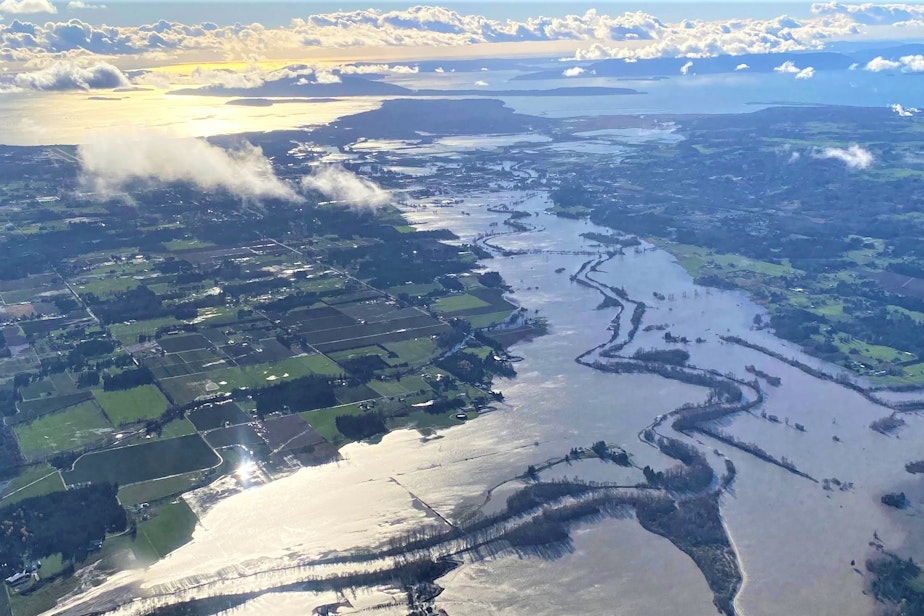After another harsh winter, Whatcom County continues flood repair

Whatcom County is no stranger to flooding. In fact, since the devastating floods of 2021, the county has actually paid some residents in floodplain areas to move elsewhere.
But that’s left attractive space for some people who can’t afford homes, who are moving into areas like Marietta, just northwest of Bellingham, and living out of RVs and cars — even though they know there’s a high risk that it’ll flood.
One particular stretch of road on Marine Drive in Marietta, just northwest of Bellingham, has become a hotspot for residents on wheels.
Then, last December, flood waters struck in the middle of the night, destroying many of the vehicles and the belongings of the people who had moved into the area.
Soundside spoke with Bellingham-based Salish Current reporter Kai Uyehara about his reporting on the community.
"This winter we had a number of terrible conditions for flooding," Uyehara said. "King tides, snow melts, and ice storms. And in December, this culminated in a complete flooding of Marine Drive."
The vehicle community has congregated in the area because it's largely empty, and there is less enforcement of the 72-hour park rule that exists in Bellingham. Some residents have long lived in vehicles, and others used to live in homes nearby but haven't found a suitable or affordable housing option elsewhere.
Sponsored
Residents believe their vehicles allow them to avoid the regular flooding of the nearby Nooksack River, giving them a more mobile solution than living in residential homes. But the flooding last Christmas was sudden, catching even the mobile community off guard.
"Being in an RV, having all those things completely inundated with water, a lot of electronics broken — that's kind of all they have," Uyehara said. "And so it's very devastating on that level because you have vehicles that no longer run, batteries, and clothes, and mattresses that are all pretty much destroyed."
Some residents received financial and other forms of aid from the Red Cross and FEMA, though the process for receiving that aid has been slow. Uyehara said some residents are considering leaving — a hard decision for those who've found both refuge and community in Marine Drive.
For more information on the county’s plans for Marietta and its long-term flood strategy, Soundside spoke with Whatcom County Flood Manager Paula Harris. Harris said that in some areas, like Marietta, levees are designed with flooding in mind.
"Our river can't hold the volume of water that comes down, so a lot of our levees are designed to overtop," Harris said. "And typically that's in agricultural areas where that overtopping is, because it's doing that during the winter when the crops aren't out there."
Sponsored
The area behind the levee in Marietta used to be an agricultural floodplain, and has been in transition toward a wildlife refuge.
Harris said that the county has been working to buy out homes in the area since 2021, when the overflowing of the Nooksack River caused tens of millions of dollars in damage. Under the Hazard Mitigation Grant Program, the county offers residents the options of a buyout or upgrades to raise their homes.
But it's a grant program that is voluntary, meaning if residents in Marietta want to stay, they can choose to.
"We're not trying to force people out, but when they're ready to go, we're ready to help them get out and hopefully get to a better place," Harris said. "Every time we have an opportunity for grant funding to get some money for continuing this program down there, we send letters out to the community to see if they're interested."
Harris said the county has acquired around two-thirds of homes in the area.
Sponsored
The county is also exploring how it can best prepare for floods of the future — especially ones with little to no warning, like the December floods.
Part of that preparation is working in conjunction with FEMA to add more to the top of the levees, which Harris hopes can be completed this summer. The county is also speaking with communities along the Nooksack river to identify their concerns with the conditions of levees and flooding, and how they’d like those issues addressed.
Harris said the county is trying to be as careful as possible while keeping climate change in mind.
"Ranging from setting back levies or constructing new levies, a whole host of physical actions that we can model and see what difference that makes, in terms of flood levels and flows being diverted," Harris said. "So [we're] really trying to understand the implications of any potential action before we take it."
You can read more of Kai Uyehara's reporting here.
Sponsored
You can listen to the full broadcast segment by clicking "play" on the audio above.



